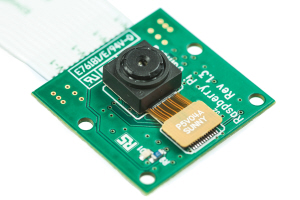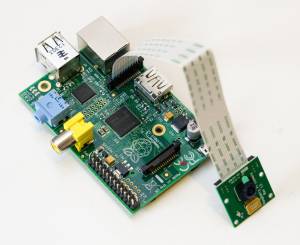User Tools
Site Tools
Navigation
Internships & Projects
Raspberry Pi
Code Embarqué et Temps Réel
SE et Pilotes
[Protected]
Table of Contents
new OpenCV & video4linux RPi camera support
Finally, it happened: as of 2014, May, the new 2.4.9 OpenCV release features support for Raspberry Pi camera module :)
This will leverage the needs for a seamless usage of our camera within openCV code.
However, to benefits from openCV support of RPi camera, we ought to:
- Upgrade RPi packages and Firmware,
- Enable camera support at system level,
- Load video4linux RPi camera kernel mode @ boot time,
- lastest openCV install,
- C & python sample code using freshly installed openCV,
- [alternative] Build openCV for Scientific Linux 6.5.
Warning: very long operation The whole process leading you to a new working openCV with RPi camera support will take almost 10 hours!
RPi upgrade
To benefits from the new video for linux driver that exposes an interface to openCV, you need first to fully update your RPi.
sudo su apt-get -y update apt-get -y upgrade /sbin/reboot
Note: last reboot may not be usefull if there has not been any kernel upgrade.
Now we'll update the RPi's firmware itself.
sudo su apt-get -y install rpi-update rpi-update /sbin/reboot
Note: You may want to restart a firmware upgrade anew after reboot occured.
Enable camera support
To enable camera support @ system-level on the RPi:
raspi-config
Then select enable camera.
As an alternative, you can also enable camera support using CLI:
cat >> /boot/config.txt # for more options see http://elinux.org/RPi_config.txt start_x=1 gpu_mem=128 EOF
Permanent kernel module
The most convenient way is to have Video for Linux kernel module bcm2835-v4l2 loaded at boot time:
cat >> /etc/modules << EOF # v4l2 camera bcm2835-v4l2 EOF
Upon next reboot, the kernel module will be loaded –> #lsmod | grep -i v4l2 to check.
As an alternative, you may also load the kernel module immediately using modprobe bcm2835-v4l2.
Below is an excerpt of the v4l2 kernel module documentation:
# Load the module
sudo modprobe bcm2835-v4l2
# Control the viewfinder
v4l2-ctl --overlay=1 # enable viewfinder
v4l2-ctl --overlay=0 # disable viewfinder
# Record a video
v4l2-ctl --set-fmt-video=width=1920,height=1088,pixelformat=4
v4l2-ctl --stream-mmap=3 --stream-count=100 --stream-to=somefile.264
# Capture a JPEG image
v4l2-ctl --set-fmt-video=width=2592,height=1944,pixelformat=3
v4l2-ctl --stream-mmap=3 --stream-count=1 --stream-to=somefile.jpg
# Set the video bitrate
v4l2-ctl --set-ctrl video_bitrate=10000000
# Set the video framerate
v4l2-ctl --set-parm=5
# List the supported formats
v4l2-ctl --list-formats
openCV install
Finally, you're now ready to launch the longuest part of this tutorial: lastest openCV installation.
Some of the information below have been borrowed over the Internet and adapted to the available software at the time of writing (2014, June).
http://robertcastle.com/2014/02/installing-opencv-on-a-raspberry-pi/
[1] required packages
sudo su apt-get -y install build-essential cmake cmake-curses-gui pkg-config libpng12-0 \ libpng12-dev libpng++-dev libpng3 libpnglite-dev zlib1g-dbg zlib1g zlib1g-dev \ pngtools libtiff4-dev libtiff4 libtiffxx0c2 libtiff-tools libeigen3-dev apt-get -y install libjpeg8 libjpeg8-dev libjpeg8-dbg libjpeg-progs ffmpeg \ libavcodec-dev libavcodec53 libavformat53 libavformat-dev libgstreamer0.10-0-dbg \ libgstreamer0.10-0 libgstreamer0.10-dev libxine1-ffmpeg libxine-dev libxine1-bin \ libunicap2 libunicap2-dev swig libv4l-0 libv4l-dev python-numpy python-dev libgtk2.0-dev
[2] retrieve openCV lastest archive
At the time of writing, latest available openCV archive is rev. 2.4.9
wget http://downloads.sourceforge.net/project/opencvlibrary/opencv-unix/2.4.9/opencv-2.4.9.zip
[3] unzip and prepare to build
unzip opencv-2.4.9.zip cd opencv-2.4.9 mkdir release cd release ccmake ../
[4] build options
After having launched ncurse version of the cmake gui, press c to configure with the following options:
ANT_EXECUTABLE ANT_EXECUTABLE-NOTFOUND BUILD_DOCS OFF BUILD_EXAMPLES OFF BUILD_JASPER ON BUILD_JPEG ON BUILD_OPENEXR ON BUILD_PACKAGE ON BUILD_PERF_TESTS ON BUILD_PNG ON BUILD_SHARED_LIBS ON BUILD_TBB OFF BUILD_TESTS ON BUILD_TIFF ON BUILD_WITH_DEBUG_INFO ON BUILD_ZLIB ON BUILD_opencv_apps ON BUILD_opencv_calib3d ON BUILD_opencv_contrib ON BUILD_opencv_core ON BUILD_opencv_features2d ON BUILD_opencv_flann ON BUILD_opencv_gpu ON BUILD_opencv_highgui ON BUILD_opencv_imgproc ON BUILD_opencv_legacy ON BUILD_opencv_ml ON BUILD_opencv_nonfree ON BUILD_opencv_objdetect ON BUILD_opencv_ocl ON BUILD_opencv_photo ON BUILD_opencv_python ON BUILD_opencv_stitching ON BUILD_opencv_superres ON BUILD_opencv_ts ON BUILD_opencv_video ON BUILD_opencv_videostab ON BUILD_opencv_world OFF CLAMDBLAS_INCLUDE_DIR CLAMDBLAS_INCLUDE_DIR-NOTFOUND CLAMDBLAS_ROOT_DIR CLAMDBLAS_ROOT_DIR-NOTFOUND CLAMDFFT_INCLUDE_DIR CLAMDFFT_INCLUDE_DIR-NOTFOUND CLAMDFFT_ROOT_DIR CLAMDFFT_ROOT_DIR-NOTFOUND CMAKE_BUILD_TYPE Release CMAKE_CONFIGURATION_TYPES Debug;Release CMAKE_INSTALL_PREFIX /usr/local CMAKE_VERBOSE OFF CUDA_BUILD_CUBIN OFF CUDA_BUILD_EMULATION OFF CUDA_HOST_COMPILER /usr/bin/gcc CUDA_SDK_ROOT_DIR CUDA_SDK_ROOT_DIR-NOTFOUND CUDA_SEPARABLE_COMPILATION OFF CUDA_TOOLKIT_ROOT_DIR CUDA_TOOLKIT_ROOT_DIR-NOTFOUND CUDA_VERBOSE_BUILD OFF EIGEN_INCLUDE_PATH /usr/include/eigen3 ENABLE_COVERAGE OFF ENABLE_NEON OFF ENABLE_NOISY_WARNINGS OFF ENABLE_OMIT_FRAME_POINTER ON ENABLE_PRECOMPILED_HEADERS ON ENABLE_PROFILING OFF ENABLE_SOLUTION_FOLDERS OFF ENABLE_VFPV3 OFF EXECUTABLE_OUTPUT_PATH /root/opencv-2.4.9/release/bin GIGEAPI_INCLUDE_PATH GIGEAPI_INCLUDE_PATH-NOTFOUND GIGEAPI_LIBRARIES GIGEAPI_LIBRARIES-NOTFOUND INSTALL_CREATE_DISTRIB OFF INSTALL_C_EXAMPLES OFF INSTALL_PYTHON_EXAMPLES OFF INSTALL_TESTS OFF INSTALL_TO_MANGLED_PATHS OFF OPENCV_CONFIG_FILE_INCLUDE_DIR /root/opencv-2.4.9/release OPENCV_EXTRA_MODULES_PATH OPENCV_WARNINGS_ARE_ERRORS OFF OPENEXR_INCLUDE_PATH OPENEXR_INCLUDE_PATH-NOTFOUND PVAPI_INCLUDE_PATH PVAPI_INCLUDE_PATH-NOTFOUND PYTHON_NUMPY_INCLUDE_DIR /usr/lib/pymodules/python2.7/numpy/core/include PYTHON_PACKAGES_PATH lib/python2.7/dist-packages SPHINX_BUILD SPHINX_BUILD-NOTFOUND WITH_1394 OFF WITH_CUBLAS OFF WITH_CUDA OFF WITH_CUFFT OFF WITH_EIGEN ON WITH_FFMPEG ON WITH_GIGEAPI OFF WITH_GSTREAMER ON WITH_GTK ON WITH_JASPER ON WITH_JPEG ON WITH_LIBV4L ON WITH_NVCUVID OFF WITH_OPENCL OFF WITH_OPENCLAMDBLAS OFF WITH_OPENCLAMDFFT OFF WITH_OPENEXR ON WITH_OPENGL ON WITH_OPENMP OFF WITH_OPENNI OFF WITH_PNG ON WITH_PVAPI ON WITH_QT OFF WITH_TBB OFF WITH_TIFF ON WITH_UNICAP OFF WITH_V4L ON WITH_VTK OFF WITH_XIMEA OFF WITH_XINE OFF
… then press 'g' to generate the various makefiles.
[5] build | the 10 hours step!
In order to ease this process, best is to launch it within a tmux session:
apt-get -y install tmux cat >> ~/.tmux.conf << EOF # remap prefix to Control + a set -g prefix C-a unbind C-b bind C-a send-prefix # force a reload of the config file unbind r bind r source-file ~/.tmux.conf # quick pane cycling with C-a C-a unbind ^A bind ^A select-pane -t :.+ EOF
Note: this tmux config files let tmux to behave the same as screen with the same command set.
We'll now launch a tmux session, launch build and disconnect from session:
tmux make && make install //type CTRL + a then d for disconnect//
To reconnect to a running tmux session tmux attach.
Congratulation, you've just installed latest openCV version with video4linux support for RPi camera :)
Sample code
You'll find below some simple examples making use of your freshly installed new openCV version.
- opencv_test.py
#!/usr/bien/env python # -*-coding:Utf-8-* import cv2.cv as cv #default to capture from /dev/video0 capture = cv.CaptureFromCAM(0) while True: # Grab one frame from camera frame = cv.QueryFrame(capture) # Display frame in a window cv.ShowImage( "image", frame ) # Wait for ESC to end program c = cv.WaitKey(7) % 0x100 if c == 27: break cv.DestroyAllWindows()
… then launch this application test
chmod a+x opencv_test.py ./opencv_test.py
Note: ESC key to quit.
Another test using this time the openCV's C libraries.
- opencv_test.cpp
#include "opencv2/highgui/highgui.hpp" #include <iostream> using namespace std; using namespace cv; int main(int argc, char** argv){ VideoCapture cap(-1); if (!cap.isOpened()) { cout << "Cannot open camera" << endl; return -1; } cap.set(CV_CAP_PROP_FRAME_WIDTH, 640); cap.set(CV_CAP_PROP_FRAME_HEIGHT, 480); namedWindow("Output",CV_WINDOW_AUTOSIZE); while (1) { Mat frame; bool bSuccess = cap.read(frame); if (!bSuccess) { cout << "Cannot read a frame from camera" << endl; break; } imshow("Output", frame); if (waitKey(30) == 27) { cout << "Exit" << endl; break; } } return 0; }
Code compilation and launch
gcc opencv_test.cpp -o opencv_test -lopencv_core -lopencv_highgui ./opencv_test
As an alternative, you can check the availability of the libs @ system.
pkg-config: to test availability of the opencv package @ system level
pkg-config --libs opencv /usr/local/lib/libopencv_calib3d.so /usr/local/lib/libopencv_contrib.so /usr/local/lib/libopencv_core.so /usr/local/lib/libopencv_features2d.so /usr/local/lib/libopencv_flann.so /usr/local/lib/libopencv_gpu.so /usr/local/lib/libopencv_highgui.so /usr/local/lib/libopencv_imgproc.so /usr/local/lib/libopencv_legacy.so /usr/local/lib/libopencv_ml.so /usr/local/lib/libopencv_nonfree.so /usr/local/lib/libopencv_objdetect.so /usr/local/lib/libopencv_photo.so /usr/local/lib/libopencv_stitching.so /usr/local/lib/libopencv_superres.so /usr/local/lib/libopencv_ts.a /usr/local/lib/libopencv_video.so /usr/local/lib/libopencv_videostab.so -lrt -lpthread -lm -ldl
openCV build@SL65
To install openCV @ Scientific Linux 6.5, the same procedure applies as for the RPi version except libs dependencies resumed below:
[Nov. 14]: updated to OpenCV 3.0
yum -y install cmake28 cmake28-gui gcc gcc-c++ gtk2-devel gtk+-devel libpng-devel libjpeg-devel libtiff-devel jasper-devel libpng-devel zlib-devel eigen3-devel ffmpeg ffmpeg-devel bzip2-devel
Note: no rtsp support without ffmpeg!
… and do not forget to add libs paths to the LD_LIBRARY_PATH env var:
cat >> /etc/ld.so.conf.d/opencv.conf << EOF /usr/local/lib EOF
… and activate the new paths:
ldconfig
openCV build in a VM
Warning: qemu-kvm illegal instruction issue When building openCV in a VM, you must pay attention to processor's features
#> cat /proc/cpuinfo | grep -E "^flags" flags : fpu de pse tsc msr pae mce cx8 apic sep mtrr pge mca cmov pse36 clflush mmx fxsr sse sse2 syscall nx lm unfair_spinlock pni cx16 hypervisor lahf_lm
Here are typical processor flags of a qemu-kvm VM instance. This leads to some adjustements to the openCV compilation flags:
...... ENABLE_AVX OFF ENABLE_SSE3 OFF ENABLE_SSE4 OFF ENABLE_SSE4_1 OFF ENABLE_SSE4_2 OFF ENABLE_SSSE3 OFF ......
 Except where otherwise noted, content on this wiki is licensed under the following license: CC Attribution-Share Alike 4.0 International
Except where otherwise noted, content on this wiki is licensed under the following license: CC Attribution-Share Alike 4.0 International
